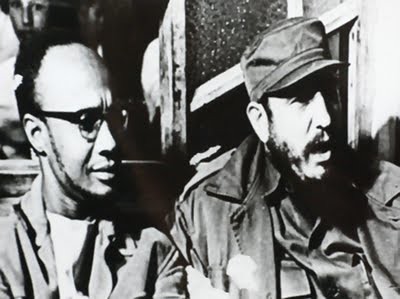
Amilcar Cabral, co-founder of the African Party for the Independence of Guinea and Cape Verde (PAIGC) along with Fidel Castro former President of Cuba and Secretary General of the Communist Party. Cuba plays an integral role in the African Revolution., a photo by Pan-African News Wire File Photos on Flickr.
African Revolutionary Heros: Amilcar Cabral, The Visionary
01 Friday Feb 2013
Guin Guin Bali
The outstanding African leader Amilcar Cabral was assassinated on January 20, 1973 by agents working for the Portuguese fascist regime, in an attempt to halt the Guinean people’s war of liberation.
A founding member of the African Party for the Independence of Guinea Bissau and Cape Verde (PAIGC), Amilcar was shot dead in PAIGC offices in Conakry, capital of the neighboring Republic of Guinea, during preparations for a decisive stage in the emancipation struggle.
The PAIGC leader was both an eminent strategist in confrontations with the Portuguese regime, and a lucid thinker; his ideas and writings extended beyond the national context to the continental level.
He is considered a scholar of African political and social realities; his analyses exposed the nature of problems besetting the continent, first derived from slavery and then from the subsequent colonialist regimes.
Armed with this ideological strength, he presented the situation of Africa and the peoples of Guinea and Cape Verde in the most diverse forums. In 1966 he participated in the Tricontinental Conference in Havana, an event which brought together important Third World leaders.
Portuguese conquistadores reached Guinea Bissau and the Cape Verde archipelago, 300 kilometers from the west coast of Africa, in the 15th century. The slave trade continued until 1840 in both territories and was followed by their colonial status.
The Portuguese presence was never accepted peacefully, and there were various forms of resistance to foreign occupation. The initial struggle was based around reforms and subsequently became a battle for independence. The liberation movement gained in strength after World War II (1939-1945).
INITIAL STEPS
Amilcar Cabral was born September 12, 1924 in Bafata, a small town near the Bambadinca Garrison, the Portuguese army’s largest military installation on the Eastern Front; he graduated in agronomy and rejected colonial domination at an early age.
Beginning in 1954 the idea of building the anti-colonial struggle in Guinea Bissau and Cape Verde took hold. The youthful agronomist excelled as the principal leader of this movement which brought together men and women determined to break the colonial yoke.
On September 19, 1956, in a secret meeting, Amilcar and a small group of comrades founded the PAIGC, which was to carry the weight of the armed struggle against colonialism.
The organization initially operated in urban areas and its activities subsequently extended to the countryside. The Portuguese authorities’ insistence on maintaining the obsolete colonial system meant that the only way forward was insurrection.
The national liberation struggle began on August 3, 1959. Workers at the Pidjiguiti dock in the port of Bissau, called the first strike organized by the PIAGC on that date.
Police, armed forces and resident colonials confronted and fired on demonstrators, causing 50 deaths and more than 100 injuries.
The following month, on September 19, 1959, a clandestine conference took place to prepare the armed struggle and the politicization of rural areas.
Having learned the lesson of the Pidjiguiti massacre, Amilcar and other PAIGC leaders decided to adopt direct action, and in 1961, on the occasion of the second anniversary of the massacre, undertook their first guerrilla actions, accompanied by the sabotage of Portuguese enterprises.
In 1964, when the 1st PAIGC Congress took place in liberated areas of the south, the struggle entered a new stage of progress in all contexts with the creation of the Revolutionary Armed Forces of the People (FARP) and education centers for children and young people.
Faced with revolutionary action, the colonial regime increased its military forces and unleashed harsher reprisals in the urban areas; in 1966 the PAIGC announced that it had liberated more than 50% of the country’s territory.
By that date, colonial forces amounted to 25,000 men, 25 times more than in 1961. The struggle acquired a new characteristic: the PAIGC went onto the offensive and its guerrilla groups became a regular army, with mortars, cannons and bazookas.
PROCLAMATION OF THE STATE OF GUINEAS BISSAU
At the time of his death, Amilcar was meticulously preparing what he called the most important act in the country’s political life, the proclamation of the state of Guineas Bissau in the liberated areas of Madina Boe.
He considered that this act would raise the independence struggle to a new level and win the recognition of many African and other countries, which would perceive Guinea Bissau as a free state with part of his territory occupied by foreign colonial forces.
This strategy bore fruit: on September 24, 1973, the year of Amilcar’s assassination, the state of Guinea Bissau was proclaimed and immediately recognized by the nations of Africa, Asia and Latin America.
It was an effective political coup, which resulted in the collapse of colonialism in Guinea Bissau and Cape Verde. Five centuries of Portuguese domination had ended.
Amilcar Cabral became the national hero and his name is inscribed in history among other African independence leaders. (Rebelión)
No comments:
Post a Comment